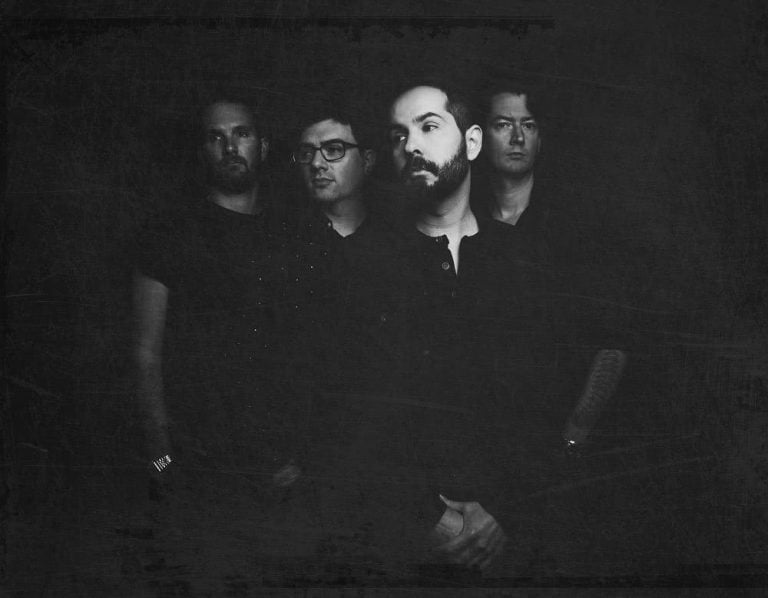It’s becoming an increasingly familiar story: a musician posts a few songs online to not much initial acclaim or attention. But then fast forward a few years and those songs have racked up tens of millions of plays, attracting a global – and distincly committed – listenership. Such is the story of Brooklyn-via-El Paso foursome Cigarettes After Sex.
Rolling on from the momentum generated by breakthrough YouTube hit ‘Nothing’s Gonna Hurt You Baby’, the ambient dream pop act released its debut self-titled LP in June 2017. From a creative perspective, the swelling fanbase didn’t derail the vision of songwriter and bandleader Greg Gonzalez – but that’s not to say that his ambitions have ever been modest.
“With this group, it was always about aiming to be a band like all the huge mainstream artists that I grew up with,” says Gonzalez. “I’m using a lot of influences that are more cult or more obscure, but a lot of my biggest influences are Madonna or someone like that – someone who’s more mainstream.”
Most discerning indie rock fans probably aren’t accustomed to their favourite new acts citing Madonna as a primary influence, and, for the sake of clarity, it’s worth pointing out that the songs on Cigarettes After Sex sound almost nothing like the hits stuffed in the pop megastar’s repertoire. However, Gonzalez says the influence stems more from what Madonna was trying to do with her music than what it sounds like – particularly during her ’80s to ’90s heyday.
“It was very quantitative and very sexual; very pop. I don’t think the band really feels like her music. It feels more like Elvis on Sun Records or Sinatra when he did In the Wee Small Hours. But both of those were still as mainstream as possible.”
Thematically, Cigarettes After Sex centres around romance, relationships and lovemaking, with the latter given particular precedence. While not all songs directly mention sex, it’s never too far away from the action. Not that the band’s coverage of lust is typical, mind you: although a lot of other songwriters pair overtly sexual lyrics and outwardly provocative music – sweaty sounds, evocative of pulsing muscles and sizzling lust – Gonzalez’s songwriting is more representative of tenderness and intimacy.
“Sex is so dangerous to talk about, mostly because of what it can mean to so many different people,” he says. “It can really go horribly wrong in some situations. But the music I want to make is coming from an honest place. [It’s about] this more passionate thing you might have with someone that can still be very positive and still hit you very deeply.
“There are relationships I’ve had where really sex was a big part of it. In terms of the passion and the feelings that you feel and love – all these things just really intermingle for me. And I just felt like it was better to talk about it [as a whole].”
Gonzalez occasionally brings colloquial sexual terminology into his lyrics, using expressions like “tits” and “sucking cock”. Any heterosexual man using this kind of language risks sounding predatory or lewd, but Gonzalez’s naïve, wistful vocal delivery helps to dodge perversion.
There are relationships I’ve had where really sex was a big part of it.
“I just felt that sort of language had to be in there as well since it was my background, coming from everyday language with my friends or with lovers or even films,” he says. “It’s just the language of now that I felt it would be dishonest to exclude. But you have to walk a very fine line when you say those things in a song, because it’s all about the way that they are said within the framework of the song. What I’m trying to achieve here is to say things that might be sexually blunt, but to do so in a way that comes across sweet. It’s more a bedroom kind of talk.
“There’s humour there and there’s honesty there and it’s everyday language, which is why I wanted to present it that way. But I can see it being taken as harsh by some people that don’t have the same background as me, even though I felt it was very normal to put those words in those songs. It’s something that was missing in modern pop music as well; anyone writing this way.”
Gonzalez has previously admitted that all of his lyrics are based on experiences from his personal life, which has allowed him to re-engage with specific memories and emotions when performing live. During the course of touring the album this year, his connection to those memories has changed shape.
“[The songs] definitely evolve and they start to take on more meanings. Sometimes I’ll play a show and there’ll be a very intense memory associated with the song that enters my mind. It’ll almost choke me up. It’s nice – you have a memory and it’s this thing that puts your whole life in perspective. So if I’m playing a show in London to 3000 people and then I think back to the memory of the song where it was just me and a girl in a room and we had nothing at that point, it’s amazing what that kind of contrast can do to your feelings.
“Also when I see people and I hear their stories about their connections with the songs, or I see them first hand in the audience, then I start to gather more memories of what these songs have meant to different people and how those new memories will affect me. It’s this interesting evolution.”
Cigarettes After Sex are set to play Max Watt’s on Wednesday January 3.
While you’re on a Madonna trip, read our review of her Sydney show here.

































